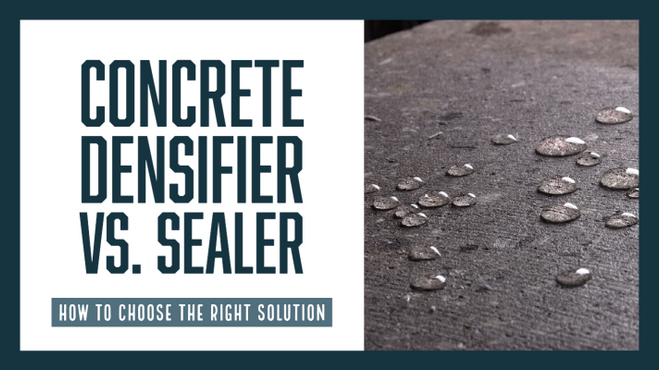Concrete Densifier vs. Sealer: How to Choose the Right Solution
25th Jul 2023
Protecting and enhancing concrete surfaces is crucial for several reasons, as concrete is one of the most widely used construction materials in the world. Whether it's in buildings, bridges, roads, or other infrastructure, concrete surfaces play a vital role in modern society.
In the concrete preparation and restoration industry, there is often confusion surrounding the difference between concrete sealer vs densifier. We are going to break down the differences and advise you on practical applications.
A concrete densifier is a chemical solution used in the construction industry to enhance the durability and strength of concrete surfaces. It is typically applied to concrete floors or pavements to increase their resistance to wear, reduce dusting, and prepare the surface for polishing.
A concrete sealer is a protective coating applied to the surface of concrete to provide various benefits and prevent potential damage. It is commonly used in construction and maintenance projects to safeguard concrete surfaces, such as floors, driveways, sidewalks, patios, and other structures.
The main purpose of a concrete densifier is to penetrate the concrete's surface and react with the calcium hydroxide present in the concrete. Calcium hydroxide is a byproduct of the hydration process that occurs when concrete is mixed with water. This reaction creates a byproduct called calcium silicate hydrate (CSH), which is a gel-like substance that fills in the pores and voids within the concrete.
It's essential to follow the manufacturer's instructions when applying a concrete densifier to achieve the desired results effectively and safely. Additionally, the success of the densification process also depends on the quality and condition of the concrete being treated.
By densifying the concrete, the following benefits can be achieved:
- Increased hardness: The densification process makes the concrete surface harder, which improves its resistance to abrasion and wear caused by foot traffic, vehicles, or other loads.
- Dust reduction: Densifiers help to seal the surface and reduce the formation of concrete dust, which can be a common issue with untreated concrete surfaces.
- Improved stain resistance: The densification process can reduce the permeability of the concrete, making it less susceptible to stains from oil, chemicals, and other substances.
- Enhanced polishing potential: If the concrete surface is intended for polishing, densifiers can prepare the surface for the polishing process, resulting in a smoother and more reflective finish.
- Longer lifespan: Concrete densification can contribute to extending the life of concrete floors and pavements by reducing surface deterioration and increasing overall durability
Concrete is a porous material, meaning it contains tiny pores and capillaries that can absorb liquids, stains, and contaminants. Concrete sealers work by penetrating the concrete or forming a protective layer on its surface, filling in these pores, and creating a barrier that inhibits the passage of water, oils, chemicals, and other substances.
Concrete sealers come in different types, including penetrating sealers, acrylic sealers, epoxy sealers, polyurethane sealers, and more. Each type of sealer has its specific properties and applications, so it's essential to choose the right sealer based on the intended use, the condition of the concrete, and the desired outcome. Applying a concrete sealer usually involves thoroughly cleaning the surface, allowing it to dry completely, and following the manufacturer's instructions for proper application. Proper surface preparation and application are crucial to ensure the sealer's effectiveness and longevity.
The main functions and benefits of using a concrete sealer include:
- Water resistance: Sealers prevent water and moisture from seeping into the concrete, reducing the risk of water damage, cracking, and spalling caused by freeze-thaw cycles.
- Stain protection: Sealing concrete surfaces makes them more resistant to stains from oil, grease, chemicals, and other substances, making maintenance and cleaning easier.
- UV protection: Some concrete sealers have UV-resistant properties, which can help protect the concrete surface from the damaging effects of prolonged sun exposure, such as fading and discoloration.
- Dust reduction: Sealers can reduce the amount of dust generated by untreated concrete surfaces, leading to a cleaner environment.
- Increased durability: By providing a protective layer, sealers can enhance the overall durability and lifespan of the concrete, making it more resistant to wear and abrasion.
- Enhancing appearance: Some sealers are designed to enhance the color and appearance of the concrete, giving it a glossy, wet look or a natural matte finish.
Concrete Sealer vs Densifier..or both?
For optimum results, we recommend using both a concrete sealer and a concrete densifier to prolong the life of your concrete floor. Sealers are topical and can chip or peel off over time and will usually need to be re-applied. Concrete densifiers, on the other hand, strengthen your concrete from the inside out. Densifiers cannot be worn down nor can they peel off, as the chemical reaction is long-lasting, irreversible, and permanent. This is why concrete densifiers and sealers work well when used together.
A concrete densifier is the best choice if you’re looking for the highest level of protection, especially if the surface is outside. However, you should go with a concrete sealer if you want to protect your concrete and it is for interior use, especially if you want an exceptional aesthetic appeal.
DiamaPro Systems Moisture Control Plus with Microban Product Protection is a penetrating sealer that provides a unique internal barrier that controls moisture vapor that has a negative effect on topically applied coatings, moisture-sensitive flooring systems, and polished concrete dyes. It can be used to replace a liquid densifier/hardener to densify and harden the surface of cementitious substrates when polishing concrete or cement-based overlays.
As always, if you need help deciding between a concrete sealer versus densifier, or a combination of the two is best for your concrete floor, feel free to give us a call so we can find the best solution for your specific needs!

